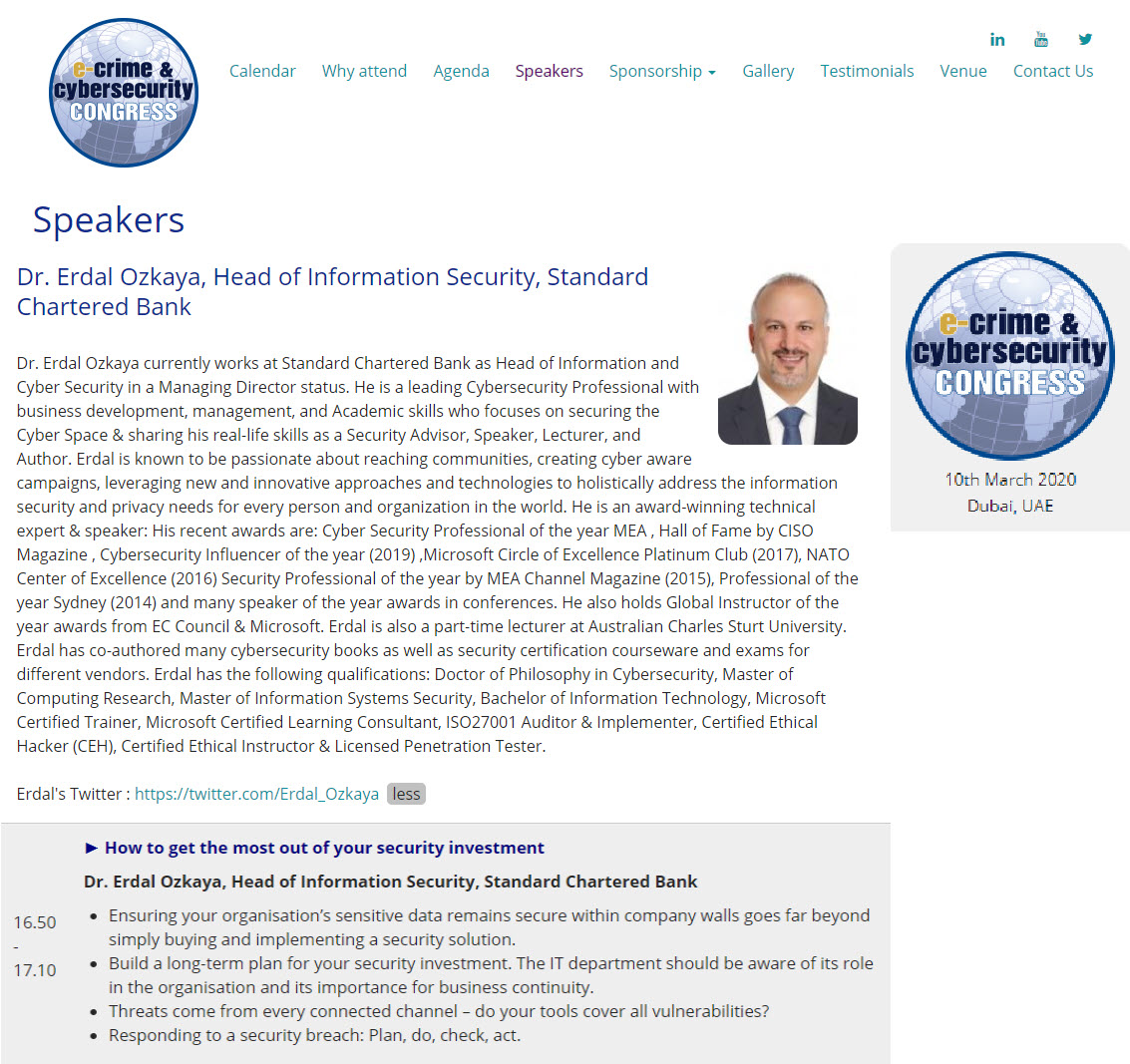
E-Crime and Cybersecurity Congress in Dubai (12th- join us Free )
E-Crime and Cybersecurity Congress in Dubai 10th March 2020
Securing citizens and stakeholders:
Governments and corporations must provide next-generation service with security built in
Technology is radically changing the expectations of consumers and citizens.
In Dubai, the government has stated explicitly that traditional processes need to be continuously updated to ensure efficiency and speed in Government to Consumer (G2C) and Government to Government (G2G) services. As they put it:
“Leveraging emerging technologies such as Blockchain, Artificial Intelligence, along with harnessing Data Science capabilities, we are recreating everyday experiences for residents and visitors of Dubai, making them more personalized, seamless, efficient and impactful.”
But this level of digitalisation needs to be cyber secure.
Governments and their agencies must build security into their new technologies.
Citizens must be kept safe from a wide range of hostile threat actors and unlike other regions across the globe, where monetizable data is the main target for cyber attackers, the Middle East is witnessing a surge in political and strategic hacking. Given the prevalence of state-directed attacks, it is states who are best-placed to defend their populations.
At the same time, the private sector must also redouble its efforts and invest in cloud security and data security as major cloud service providers set up in the region and business pivots to a Cloud-first strategy.
On top of this, the Data Protection Law (DPL) implemented in Bahrain in April 2019, and the likelihood that the UAE will also enact strict data privacy rules by the end of 2020, are forcing MENA organisations to rethink their data security framework.
As a result, MENA enterprise information security and risk management spending will total US$1.7 billion by 2020, an increase of 10.7% from 2019, according to a recent forecast by Gartner.
The 12th e-Crime & Cybersecurity Congress in Dubai will look at the latest in the processes and technologies used to protect data, identity and digital transformation. There will be real-life case studies, strategic talks and technical break-out sessions from the security and privacy teams behind some of the world’s most admired brands, who know, just like you, that security is now more important to business than ever.
For more info : https://akjassociates.com/event/dubai
For more evets :
https://www.erdalozkaya.com/category/free-events/

Good news: the regulators are coming
Mandatory requirements on data privacy are yesterday’s news, but new cybersecurity regulations will finally force Boards to resource security appropriately for the long term
The lack of a formal set of regulations around cybersecurity has always been a challenge for CISOs. Unable to quantify cyber-risk, and lacking a mandatory set of standards, security budgets have tended to rise after incidents and then fall as the memory of problems recedes.
So, it matters that Saudi Arabia’s Communications and Information Technology Commission (CITC) has just announced the implementation of a regulatory framework for service providers in the communications, IT, and postal services sectors.
The framework, in the region’s largest economy, contains a comprehensive set of cybersecurity requirements and controls and seeks to ensure the implementation of adequate cybersecurity measures following the best international practices. It also requires the adoption of a risk management methodology and the fulfilment of all cybersecurity requirements by service providers to enable them to deal with cyber threats effectively.
This initiative mirrors other global developments. An updated EU Cybersecurity Act introduces an EU-wide cybersecurity certification framework for ICT products, services and processes. The UK has announced a new law to make sure virtually all smart devices meet new requirements. And banking regulators in the UK, Europe and US are targeting cybersecurity as part of the broader drive for operational resilience. Middle Eastern regulators are following suit.
This regulation is coming just in time. While many cyber attacks in the Middle East have been connected to political actors, digitalisation and the expansion of the IoT have opened up the region’s companies and public sector entities to a much broader range of potential attackers.
According to Mohamed al-Kuwaiti, head of UAE Government Cyber Security, the Middle East region is facing a “cyber pandemic” as hackers take advantage of Covid-related digital adoption.
Banks, universities and healthcare companies have seen huge increases in attacks, with ransomware and phishing attacks becoming ever more sophisticated. Companies and CISOs must act now.
The e-Crime & Cybersecurity Congress for the Middle East will take place online and will look at how accelerated digitalisation requires a new kind of security. Join our real-life case studies and in-depth technical sessions from the security and privacy teams at some of the world’s most admired brands





